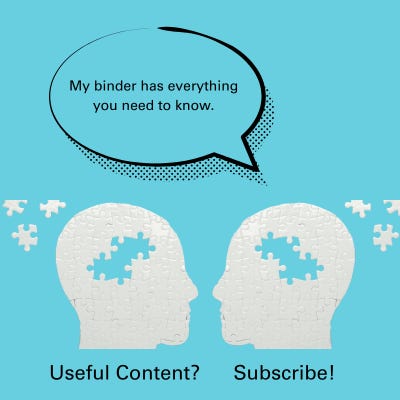10 Vital Steps to Take When Facing Early Onset Alzheimer's While You Still Have Time
Do these things as soon as you get your diagnosis. Then go out and enjoy your life.
I was recently given a tentative diagnosis of early-onset Alzheimer’s. The signs are all there; it’s just a matter of having a few brain scans to confirm which parts of the brain are being affected.
My short-term memory is impaired, and I frequently struggle to recall the right words to complete a sentence.
However, at least for now, I have enough cognitive ability to prepare the things my family will need to access when I can’t speak or think for myself.
9 Vital Things You Should Do While You Still Can!
I’ve decided to go a little old-school with this by organizing everything into a binder.
That way, my friends and family will be able to access important passwords, usernames, information on how to make a life insurance claim through my former employer, and so on.
Your binder may not look like mine, but here are some ideas to help you get started.
1. Complete Advance Directives
This includes a living will that should describe the type of treatment you want (or don’t want).
It should also include a Power of Attorney for Health Care. This should be someone you completely trust to make medical decisions for you.
You’ll need to sign the forms in front of a notary or witnesses, depending on your state’s rules.
Once signed, give copies to the person you named, your doctor, and keep one in a safe place (like a home binder). If your situation is more complex, talk to an elder law attorney for extra guidance.
3. Create or Update a Will (and Consider a Trust)
A will can help you clarify your assets and belongings. This way, you won’t leave your family and friends wondering what to do with your stuff.
Collect Important Forms & Documentation
Key information that I’m including in my binder consists of the following:
List of commonly used apps, especially banking apps
Emails, phone numbers, and passwords needed to access these apps.
A plastic sleeve for my will and another one for my living will.
A signed power of Attorney form
Medical Info & Diagnoses
Legal Documents
Financial Accounts
Insurance & Pension Info
Contacts List
Daily Preferences & Routines
End-of-Life Wishes
Personal Messages
Create a “Life Binder” with an Index
Having a constructive, informative, and organized banner will go a long way in limiting the amount of stress your family, friends, or caregivers will experience.
When collecting the information mentioned above, make sure to include an index and number your pages for easy access.
Use a 3-ring binder or digital folder (or both)
Include a printed index at the front, something like:
4. Add a “Key Contacts” Page in Your Binder
Include names, phone numbers, emails, and what they help with.
Key Contacts Example
Jane Smith (Elder Law Attorney)
📞 (555) 123-4567 | ✉️ jane@lawfirm.com
Helps with will, trust, and power of attorney documentsMike Johnson (HR & Pension Administrator at XYZ Co.)
📞 (555) 555-2345 | ✉️ mike.j@xyzcompany.com
Handles pension transfer and survivor benefitsSarah Lee (Insurance Representative, ABC Life)
📞 (800) 333-9876 | ✉️ sarah@abclife.com
Point of contact for life insurance claim and payoutDr. Emily Chan (Neurologist)
📞 (555) 777-1212 | ✉️ echan@hospital.org
Knows your medical history and treatment plan
5. Document Your Daily Routines and Preferences
Write down:
How you like your coffee
Sleep schedule
Favorite foods and music
Comfort items or calming routines
How many visitors do you think you can handle in a day
This helps family or caregivers maintain your quality of life and dignity.
6. Write a Personal Letter or Record a Video
It’s hard for me to get my head around, but I know that the time will come (probably sooner rather than later) when I won’t be able to express myself clearly.
I want people to remember my sense of humor and pragmatic style. I admit that I haven’t considered what this might look like just yet. I might even skip it.
That said, there’s no better time to express your love and gratitude than now.
7. Plan for Future Care
This is a tough one. It’s hard to tell exactly what the future will look like for people like me, with dementia. Do I my husband, or another person, to have to soothe me when I’ve wet my bed and am pacing around the house?
My opinion is that once I can no longer recognize or communicate with people, I’m gone.
Therefore, now is the time to look into MAID (medical assistance in dying) so that when the time comes, we’ll be ready.
Religious qualms?
If you don’t believe in MAID for any reason, then it’s especially important to talk about long-term care and what it might mean.
8. Create a Medical Summary
This is just a simple way to ensure that those looking out for you have all the information they need. Of course, things like current medications can change over time, but having the information in hand from the start is a really good idea.
This section could include things like:
Diagnoses
Allergies
Current medications
Emergency contacts
9. Communicate Early and Honestly
Once your binder is complete, make sure your family knows about it. Lock it in a safe and give your future caregiver a key. It’s a good idea to have a few other locks made for other family members as well.
10. Write down any paid subscriptions you have.
If you’re anything like me, you may have monthly payments coming off your credit card for things like magazine renewals, paid apps, and so on. It’s a good idea to list the apps you use and include your username and password so that people can cancel them after your death.
If there are some you’re not using, go ahead and cancel them now.
Can you think of anything else I should put in my binder? What would you put in your binder if you were facing dementia?
Leave me a comment or get in touch directly!
Thank you for reading!







